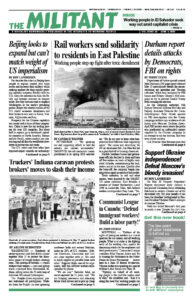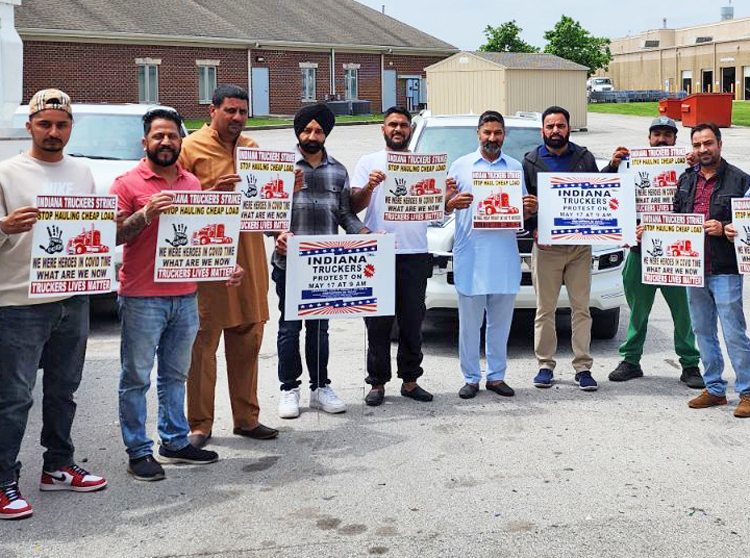WASHINGTON — Hundreds of owner-operators and fleet drivers joined together May 17 to protest the disastrous impact of freight brokers slashing rates. The caravan of bobtails — trucks without their trailers — cars and pickup trucks convoyed from Greenwood, Indiana, rolling across the 52-mile loop of Interstate 465 around Indianapolis.
The Punjabi-driver-organized protest welcomed all participants. Workers from the Punjab, an area spanning northwest India and eastern Pakistan, make up 20% of U.S. truckers. “African Americans, Caucasians and Latinos came together with us. We need as much support as possible from each other,” Rajpreet Walia, one of the organizers, told this Militant worker-correspondent by phone.
“We are one,” Narinder Johal, an owner-operator for 25 years, said. “We are bringing awareness and educating fellow truck drivers not to pick up cheap freight. We organized not to disrupt traffic — but to get our point across.”
According to Freightways, the national average spot rate for truckers is $1.49 a mile, lower than in 2019. But when you deduct the 30 cents a mile increase in expenses over the past three years — not including fuel — the current rates are the equivalent of $1.19 a mile.
“The brokers who set the rates are scavengers, searching for the cheapest carrier,” Johal said. A broker offered him a job last week. “After truck payments, insurance, fuel, driver pay, repairs, gas tax and more, the load price on a trip from Louisville, Kentucky, to Michigan would have left me with $16.
“‘I don’t have time for the attitude’ was the broker’s response,” Johal said after he protested about the low rate.
The crisis owner-operators face today is the result of the drive by shipping bosses and brokers — backed up by the Democratic and Republican parties — to maximize profits at drivers’ expense.
In 1980 the government deregulated trucking, opening the door to a union-busting offensive. It turned a largely Teamster-organized industry into a scrum of nonunion bosses seeking to drive down wages, extend hours and enforce more unpaid labor.
Since truckers are paid by the mile, time spent at warehouses waiting to be loaded or unloaded, repairing breakdowns or idling in traffic tie-ups counts for nothing and yields no income.
“Like all workers, we don’t want to work a minute for free,” said Walia.
The Federal Motor Carrier Safety Administration, a federal agency, winks at the provisions brokers have in the contracts that force truckers to waive their rights to view transaction records as a condition for getting work.
The Indianapolis action was the latest push by truckers to fight attacks on their livelihoods by shippers, brokers, truck bosses and government agencies. On May 1 the Truckers Movement for Justice led a protest outside the U.S. Department of Transportation here, carrying signs that demanded, “All hours paid for all hours worked” and for “Paid overtime.”
“This has been going on for years,” trucker Caleb Fernandez told the Militant at the D.C. protest. “We don’t need task forces and studies. We need to organize.”


